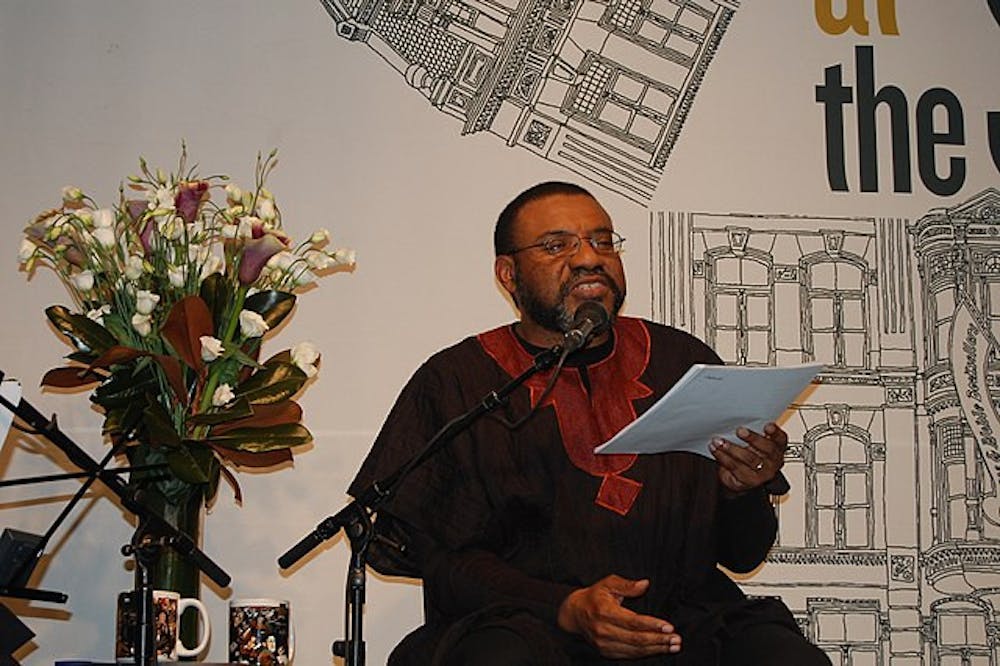Poet Kwame Dawes read a collection of his recent poetry for an audience of University students and faculty Wednesday evening. The event kicked off his semester-long residence at the University as part of the Distinguished Visiting Writers of Africa and the African Diasporas series, a collaboration between the departments of Literary Arts, Rites and Reasons Theater and Africana Studies.
Dawes is the Chancellor’s Professor of English at the University of Nebraska, as well as the recipient of a 2009 Emmy award and Guggenheim fellowship. He is the author of 36 books, the producer of 15 plays and previously spoke at the University in 2015 as part of the “Caribbean Poets Discussion.”
Born in Ghana, Dawes lived in Jamaica for most of his early life, moving to the United States after completing his PhD at the University of New Brunswick in Canada. His work spans the fields of African diaspora literature, Caribbean literature and African literature.
Co-organizer and Chair of the Literary Arts department Matthew Shenoda quoted Dawes on the role of the poet in his introductory remarks.
“The poet has an additional burden of witnessing, and the secondary practice of chronicling it,” Shenoda read. “It’s hard work. It’s painful work. It’s difficult work. But that is what the writer is expected to do.”
Themes in Dawes’ collection include the body, mortality, legacy and familial relationships.
Dawes’ poetry especially explores his relationship with his father, an anti-imperialist and pan-Africanist who, according to Shenoda, greatly influenced Dawes’ work.
One of the poems Dawes read, “Fish, Serpent, Egg, Scorpion,” examines the narrator’s relationship to his son. Dawes related a conversation where the father reminds his son of his own mortality, drawing a parallel to a passage from the Christian Bible: “Which of you fathers, if your son asks for a fish, will give him a snake instead? Or if he asks for an egg, will give him a scorpion?”
“I am your father, use me,” Dawes read from his poem. “Every poem has its own ancestry.”
Dawes also read poems titled “It Begins With Silence,” “Death Watch” and “Sins of the Father.”
During the question-and-answer portion of the event, Dawes discussed how students are often taught to look for a poet’s intentions within a poem.
While elementary school students are trained to accept poems and nursery rhymes at face value, Dawes said, high school and college students are expected to question and critically interpret poetry. When their interpretations are challenged by teachers, students become convinced that someone knows the true “secret” behind a poem.
He explained the complexity of intentionality in poetry — even poets, he said, often don’t know how to execute their intentions. He referred to the complicated balance between the “pragmatics of being a writer” and the difficult topics poets want to write about — “our preoccupations and obsessions become the fodder for what we wrestle with on the page,” Dawes said.
“The secret in a poem … isn’t always communicated with clarity,” he said. “But (a poem) instead communicates a kind of desperation for articulation.”
According to Dawes, introducing students to poetry that “doesn’t have to end with understanding” is the best way to instill a desire to continue engaging with poetry.
Dawes also acknowledged his tendency to dwell on topics of death and mortality.
“It is hard to encounter a poet who is not fixated on death,” he said. “Part of the poet’s impulse to write is to leave something behind.”
Dawes argued that because death is a specific occurrence, it has a “defining language” that makes it clearer to write about. In reality, he said, all of his poetry is about “desperately living.”
“Every time I go to the page, I am pressing into life.”
The talk was attended by multiple graduate students in the literary arts program who hoped to learn about the link between teaching poetry and creating it from Dawes.
“I think I often forget that poetry is collective work because we’re so focused in on a particular person’s process and their art,” said Michelle Oppong-Ampofo GS. Oppong-Ampofo is studying literary arts, as well as teaching a section of LITR0110B: “Poetry I.”
“It’s always a nice reminder that poetry continues to exist because we teach it and because of the care we put into it,” she said.
Shenoda said he looks forward to the rest of Dawes’ tenure at the University, and to the future of the Distinguished Visiting Writers of Africa and the African Diasporas series.
Beginning Sept. 27, Dawes will give a series of lectures throughout the fall semester on topics like publishing and general masterclasses for University students.
“There’s been a long history at Brown of significant African and African diasporic writers coming in to do a residence between the two departments,” Shenoda said. The program “has been on hiatus for some time, and we wanted to resurrect it. We hope this becomes a regular tradition.”

Anisha Kumar is the senior editor of community and standards of The Herald's 135th editorial board. She previously served as a section editor covering University Hall and international student life. She is a junior from Menlo Park, California concentrating in English and Political Science who loves speed-crosswording and rewatching sitcoms.





